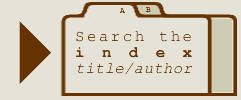| |
Featured
Annotations
Victory Garden
(Eastgate 1995)
by
Stuart Moulthrop
Annotated by: Jennifer
Jones
Moments of Victory Garden,
a by now canonical work in the context of hypertext fiction,
can be disturbingly probing of its reader. "How did it
make you feel—scared, depressed, elated, unreal? When
History unfolded around you, did you see it as a poison flower
(fucked, like the man say, down to its eternal root), or did
it seem to you a fantastic firework, some gorgeous portent
of the skies?" And yet,
the proscribed choices that this passage offers as possible
modes of response to the event around which Victory Garden
unfolds, the Gulf War, are also indicative of the way in which
the story self-consciously mobilizes this aggressive mode
of addressing its reader as a means of bringing to the fore
the restrictions for emotive response that were so present
in the media coverage—and presumably many of our experiences—of
the Gulf. As we navigate through Victory Garden, we
become immersed in the life of Emily Runbird, a graduate student
who had financed her education through government military
service, and was called into active duty when the War erupted
. Emily serves as our interface to both 'sides' of the War,
which are comprised on the one hand by those who found themselves
in the middle of a desert in nuclear combat gear with Emily,
and on the other by those who remained behind, living with
her absence, and continuing to pursue their lives (in this
context, as students or professors). This gap, which cannot
be bridged, and yet, as the story makes clear, must be pushed
beyond a tacit acceptance of the distance, is indicative of
other gaps that are powerfully explored in Victory Garden
as well—desire, passion, and not least, love.
Lust
(Eastgate 1994)
by
Mary-Kim Arnold
Annotated
by:
Jeen
Yu
Lust is
a poetically and prosaically mingled tale that is both disturbing
and quietly tender in its (re)combined sequences, or fragments,
of connection, creation, and loss between lovers and among
a man, woman, and child. Images
of violent penetration ("She runs the blade against the
surface of her skin . . . there is blood")
are tempered by those of sensual warmth ("She touches
his face, running her hands across the surface of his skin"),
and the reader will, perhaps anxiously, experience this hypertext
as constantly being "on the verge of exploding into sex,
violence, and murder." In the words of Kathryn Cramer
(author of In Small and Large Pieces), Lust "undresses
the resonances of emotionally loaded words and phrases, revealing
unspoken moments, fragments of memory, and muffled screams."
Profound and provocative in its explorations of human sexuality
and emotion, this tale uncovers for the reader the deep complexities
of lust and its often hidden consequences.
A
Dream with Demons (Eastgate
1997)
by Edward Falco
Annotated
by:
Jeen
Yu
The title of this work is intriguing
enough—the
description on the cover even more so:
"Val Rivson paints with his soul.
But no matter how frightening his paintings become, he cannot
exorcise the beasts within. Worse, a strange convulsion
binds him to Elaine, his lover, and her daughter, Missy,
twining new cycles of anger, pain, and loss."
The reader begins his or her journey through
A Dream with Demons on the contents page, which
presents nineteen provocatively titled choices—or "chapters"—(4.
Val lay on, 10. At Elaine's breast, 17. You want me), all
of which contain rather lengthy, but compelling text. Through
each "chapter," the reader enters "a contemporary
nightmare" (publisher's blurb) in which s/he encounters
an intense—often
confusing—array
of dreamlike descriptions ("When we make love I ask God
to open my heart and I walk through it like a door into the
warm other world our joined self") mixed with some rather
disconcerting ones ("Elaine. I'm sick. You should be
here for me. You bitch."). In all, this reading experience
will prove more absorbing than exhausting, despite—or
perhaps because of—the
seemingly unending textual paths.
Full
Guide to E-Literature
|
|
|
Browse
Full Guide

Selected Entries
Hypertext
Fiction:
 We
Descend Bill
Bly (Eastgate 1994) We
Descend Bill
Bly (Eastgate 1994)
Jennifer
Jones
 In Small and Large Pieces Kathryn
Cramer (Eastgate 1994)
In Small and Large Pieces Kathryn
Cramer (Eastgate 1994)
Jeen Yu
 I Have Said Nothing
J. Yellowlees Douglas (Eastgate 1995)
I Have Said Nothing
J. Yellowlees Douglas (Eastgate 1995)
Jeen Yu
 A Dream with Demons Edward
Falco (Eastgate 1999)
A Dream with Demons Edward
Falco (Eastgate 1999)
Jeen Yu
 Mahasuha Halo
Richard Gess (Eastgate 1995)
Mahasuha Halo
Richard Gess (Eastgate 1995)
Jeen Yu
 Quibbling Carolyn
Guyer (Eastgate 1995)
Quibbling Carolyn
Guyer (Eastgate 1995)
Jennifer Jones
 Patchwork Girl
Shelley Jackson (Eastgate 1995)
Patchwork Girl
Shelley Jackson (Eastgate 1995)
Jennifer Jones
 Afternoon: A Story
Michael Joyce (Eastgate 1995)
Afternoon: A Story
Michael Joyce (Eastgate 1995)
Jennifer Jones
 Completing the Circle Michael
van Mantgem (Eastgate 1995)
Completing the Circle Michael
van Mantgem (Eastgate 1995)
Jeen Yu
 Victory Garden Stuart
Moulthrop (Eastgate 1995)
Victory Garden Stuart
Moulthrop (Eastgate 1995)
Jennifer Jones
Hypertext
Poetry:
 Mothering
Judith Kerman (Eastgate 1995)
Mothering
Judith Kerman (Eastgate 1995)
Jeen Yu
 True North
Stephanie Strichland (Eastgate 1997)
True North
Stephanie Strichland (Eastgate 1997)
forthcoming annotation
|
|